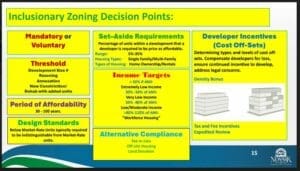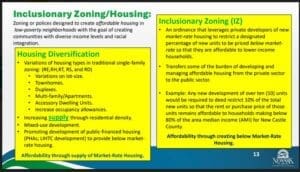

Newark planners are considering trying inclusionary zoning, which encourages developments to provide some units for lower-income people, in each project.
Johanna Voynak knows from first hand experience the pitfalls faced because of a lack of affordable housing.
She has been in temporary housing since last September after a flood caused a sewage backup in her Newark rental apartment.
The sewage backup was due to the property not being properly maintained by the owner, and resulting mold from the flood was not taken care of, Voynak said.
She and other tenants of the apartment building were faced with health issues from the mold as well as finding new residences, Voynak told Newark city planners during a virtual public workshop on housing issues last week.
This has proven to be difficult. Voynak already struggled to find the ill-maintained rental she was forced out of due to the limited housing market.
“The lack of affordable housing enables landlords to not maintain properties when tenants have nowhere to go,” Voynak said.
Landlords are maximizing profits at the cost of tenants’ safety, health and well-being, Voynak maintained.
Affordable housing is a huge problem in Delaware and across the country and has repeatedly come up in government hearings — including a joint hearing for the state Senate and House housing committee.
The problem affects lower-income people and families, whether you’re young and starting a new job, a single parent, a senior who rents or a family with lower-paying jobs. It’s considered one of the triggers for homelessness.

Inclusionary code reforms
The City of Newark’s Planning Commission believes zoning code reforms could increase affordable housing opportunities.
“We’ve done a lot of research for years on this,” said Newark Senior Planner Michael Fortner.
About 50% of Delaware renters and 20% of homeowners are living with housing challenges including cost burden, overcrowding and/or inadequate conditions.
That’s in addition to 8% of Delawareans living in their cars, couch surfing or temporarily living with friends.
That equates to nearly half of the state’s population facing challenges due to a lack of affordable housing.
To address this issue, Newark City Planners are considering inclusionary zoning, and will discuss it in a virtual coffee break season Friday that’s open to the public.
“Inclusionary zoning policies and programs are attractive because they can increase the supply of affordable units without requiring a direct outlay of public funds,” said Fortner.
That kind of zoning requires developers to designate a specific percentage of units at below market rate for those with low incomes.


For example, an inclusionary zoning provision might require 10% of new units be priced affordable for households making below 80% of the area median income.
“Inclusionary policies work best when implemented as part of a comprehensive affordable housing strategy,” Fortner said.
Areas where there is active development, high demand for new housing and market-rate units can generate enough returns to make the overall projects financially viable.
Increasing housing-types permitted in zoning districts and allowing higher occupancy rates is another proposed zoning reform.
Fortner said most of Newark is zoned such that different types of housing are off-limits.
“We can’t achieve affordable housing by building single family homes,” Fortner said.
Critics of inclusionary zoning say it only benefits residents of below market rate units and puts a burden on new residential development.
Some municipalities that follow an inclusionary zoning model make the policies voluntary, Fortner said.
If Newark were to adopt the reforms, the City Council would have to decide if they are mandatory.
“Mandatory has a better record,” Fortner said.
“I think developers may not be on board,” said Tracey Crook, a participant in last week’s Virtual Coffee Break workshop.
The public is encouraged to attend Friday’s Virtual Coffee Break.
Participants will have an opportunity to provide feedback on affordable housing challenges in Newark.
Additional virtual and in-person workshops will be announced in March.
Share this Post



